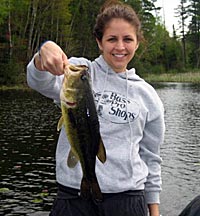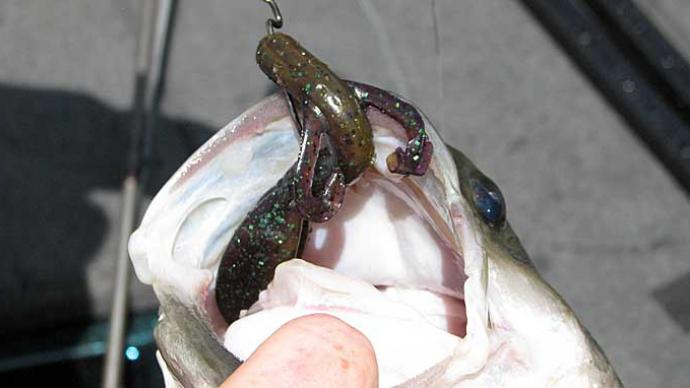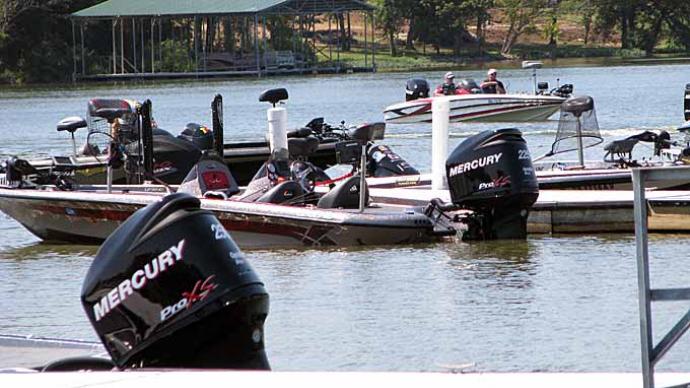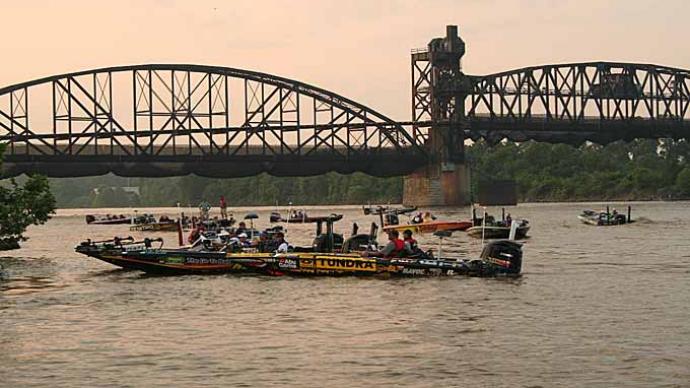
The most important thing you bring to your fishing ability is your individuality. Remember that you are an original. No one can copy you exactly. And you can't copy anyone exactly. This one fact can be the most remarkable technique you have. Your personality and individualism are significant assets if you learn how to use them in fishing. You must let your instincts take over and use that individuality to be a great fisherman.
There's nothing wrong with copying a technique from someone else or learning all you can. Just remember to apply your personality to that. With that thought in mind, here are some exercises in extending the personality of your fishing to make it more successful.
First, forget everything you know about fishing right now. You're just going to have to trust me on this one. I want you to act like you're starting all over from scratch. You'll need to rethink everything that you do now. Let yourself go on this. It's a freedom that you've forgotten all about by now. But that person new to fishing has it, and you need to get it back.
Remember when you were just a kid and didn't know that you were supposed to fish a specific rig a certain way or that you needed to fish a Carolina rig because everyone else was? Okay. Now you're getting the picture.
Next, don't think about "catching" anything. I know this sounds silly, too. But you must "become" the bass. What are your needs? How do you do the things you must do each day to survive?
I can't stress enough the importance of seasonal patterns. Read everything you can about this subject. As you read, close your eyes and imagine yourself as the fish. One foot doesn't seem like much to us but think about that in terms of the fish and its size.
You should be able to quickly pinpoint a lake's productive areas if you do a little research. Once you understand how bass live and look at that life from their perspective, these areas become easier to find. Knowing whether to back off in a pattern or move closer to the bank is a great feeling. A simple form of understanding this is done by seeing baitfish. If you see them in shallow water hanging around laydowns, how far away do you think the bass will be? Be the bass, become the fish, and envision where you would be.
Now, what's the worst lure you have in your tackle box? What's the one you hate to throw the most? Okay, now don't stop reading. Remember, I want you to trust me.
Get out your "hate" baits. If it's a crankbait, get out different sizes and throw, throw, throw. Don't take any other lures with you. I know it's hard to do, but it's something you've got to do to overcome.
Have you ever tried cutting a baling wire with regular pliers? It will get the job done, but wire snips are the proper tool. It's the same with every lure you own. You must have confidence in every one of them. You also need to know which tool to use for the situation. This comes with fishing and mastering all your lures. As you use these lures, you'll start to see ways you can apply your insight and ideas for implementation. When you do this, you can feel your confidence soar. This is the personality aspect I'm talking about.
When you throw a bait you modified to run a certain way, you will have a better feel for it. You'll be more alert and in tune with what's happening around, above, and below the water. You're willing the bait to catch a fish. I swear it's true. You can expect to become better at fishing by mastering every lure in your tackle box.
I just recently took a nice man and his son fishing for bass. He asked me about my electronics, and as I explained, I told him that, at times, I could tell him which fish would bite and which would not. He got a big chuckle out of that comment. I said I would show him, and he thought I was joking. But as we idled over an area, I made two passes and dropped a marker.
On the first cast, I caught a 3-pounder. The man and his son also began catching fish. We took pictures and had a great time. I had never fished in the area nor known that the structure we were fishing was there. Finding a killer hole with my electronics only took about five minutes. The man paid attention to everything I said for the rest of the day.
I did not tell this story to brag, although the Womacks are guilty of doing this, but to demonstrate the importance of the next step in your relearning process. That step is the use of electronics. I won't tell you what brand to buy, only that you should obtain a quality unit.
The key to using electronics is to use them. Most people turn them on and forget to use them. That's a big mistake. One of the things that helps me the most is to use my electronics to find places with structures similar to those where I have found and caught fish before. I learned I needed to pay attention to my depth finder when catching fish. This is what many people forget or overlook. Most only start pushing buttons and trying to figure something out if they're not catching fish, which is precisely the opposite of what you need to do.
As soon as you catch fish in an area, check your electronics. Pay close attention to how the fish are positioned on the structure. See if there is bait present. Are they positioned above the bass? It can help to keep a log of what you find. Then, you will start to develop patterns. And now your personality will begin to come out as your confidence grows. You'll find that you prefer certain types of structure or cover. You'll begin to fish your lures differently than everyone else because you learned it on your own. It's a great feeling. I want you to do this and not give up. It will help you immensely.
Remember the little things, too. It's the little things that are always the killers. You know that maybe you should retie, but the fish are biting good, and so you don't take the time. I guarantee the next fish you catch will be a monster, or at least big enough to snap your line. Sometimes, I think the big fish just lay there and let the smaller ones wear my line down, then swim among them and say, "Okay, boys, watch this!"
Little things will get you every time. The best thing you can do is to get in the habit of checking for little problems that may arise. The flip side is that you must create little things that enhance your fishing and let your personality emerge. This can be anything from changing a spinnerbait blade to modifying a lure to run left or right. Don't just tie a Carolina rig like it shows on the package of baits. Use the basic design and add a personal touch to it. Experiment, try all kinds of things. I promise you, no one has a monopoly on how these things are supposed to be done. Let it be an adventurous journey of personal creativity.
Okay, on to the little things for fishing tournaments. I could write a hundred horror stories about the one that got away. Before you daydream about that ride in the new boat you won, ensure you get all the little things in your tournament preparation. I promise there is no sicker feeling than watching a $25,000 boat go down the drain because of some small overlooked item or mistake.
Get in the habit of checking everything, even if you have to make a list. Do this every time you go to the lake. If you go through your checklist every time, it will become second nature to you.
Each time you have a problem on the lake, correct it. Stop and analyze the situation if you fish for two hours and hook four bass but only get one to the boat. What's going wrong? Even if you are just casual fishing, take the time to figure out what's happening and correct it. It's a big mistake not to learn from mistakes and problems. They'll cause you trouble down the road. Most of the time, it will be when that boat is on the line.
The next thing I want to talk about is knowing your strengths. About 18 years ago, I ultimately started over. I was never very good with a plastic worm. When I started rethinking everything I knew about bass fishing, I knew plastic worms were my biggest weakness. Since I always practice what I preach, I bought myself a bunch of worms, hooks, and weights. I threw and threw, then threw them some more. And while I still need to become an expert with them, I have improved my use of plastic worms. I also discovered they were one of my greatest strengths, even though I thought they didn't fit my style. So don't count out something just because you don't think it's one of your strengths.
Especially in fishing tournaments, you need to fish your strengths and work on your weaknesses when possible. Too many of us have only a few ways we like to fish, but that's not always the way to catch fish. It's easy to figure out that more (eight ways we can fish) versatility versus less (two ways we like to fish) is better.
Now, we're going to talk about the water clues. I want you to watch everything around you while on the lake. There are lots of little clues that will help you in your decision-making. Really good fishermen don't miss anything. Most of the time, there will be one or two good patterns working on any given lake. Which one you decide on depends on your personality and preferences. It should also depend on what you see. If a shad flips 100 yards down the bank, you should see it. If there's a crawdad hole under a willow bush, you should spot it. When you see a good ripple ahead along the bank, you should know whether it's a sow chasing a bluegill off its nest or a 4-pound carp.
If you catch a good fish, ask yourself why it was there. What depth was it at? Why did it bite that lure? Was it the action, the color? This little analytical approach can often lead you to your next fish. It can even be a productive pattern all day or over the lake.
What you have to do when you're at the lake is become part of it. You'll love it, and you'll love what it does for your fishing.
Now, the next step is to be yourself. When I first started fishing tournaments, I thought I needed to find out what other people were fishing and how they did it. Wrong! What happens is you try to fish like other people and abandon your personality and instincts. While there are times when knowing what others are doing is helpful as a starting place, don't rely on anyone else. When you compete, fish against yourself and the fish, not the other fishermen. Try to catch the five biggest fish you can. If you do this, everything else will take care of itself.
Your very best days of fishing are going to be the ones when you figure it out on your own. Have fun and be yourself. Some of our greatest inventions came from people who were told something wouldn't work.
If you follow all these steps, you can become a great fisherman. Understand that when I say that, it's not because I think I'm a great fisherman. But I know several of them, and all have different methods and fish different from each other. The common thing I see in them is that they have honed their skills and have a certain ease on the water. They are relaxed and just being themselves. The point is that we're all individuals. It would be a boring world if we weren't. But allowing your personality to emerge in your fishing is your greatest technique.
As always, keep a bait in the water.




